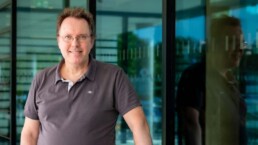Expertise
The Schiessel group has a background in theoretical biological physics and soft matter physics. The group uses both analytical methods from statistical and classical mechanics and coarse-grained computer simulations. The main focus is on processes that take place in the cell nucleus, mainly related to DNA and chromatin. Key research topics include active chromosome remodeling1,2, nuclesome dynamics3, multiplexing of information in genomes4,5, and the material properties of microdroplets6. Recently, in collaboration with the Sommer group, we proposed a generic mechanism based on condensates that allows cells to inherit epigenetic information across multiple cell generations7.
References:
- Schiessel et al. Pioneer transcription factors in chromatin remodeling: The kinetic proofreading view. Phys Rev E. 2020;101(4):040401. https://doi.org/10.1103/PhysRevE.101.040401
- Klempahn et al. Molecular motor in a box: Attractors, repellers, and ratchets in chromatin. Phys Rev Res. 2024;6(2):023236. https://doi.org/10.1103/PhysRevResearch.6.023236
- van Deelen et al. Ensembles of Breathing Nucleosomes: A Computational Study. Biophys J. 2020;118(9):2297-2308. https://doi.org/10.1016/j.bpj.2019.11.3395
- Yadav et al. The role of transcript regions and amino acid choice in nucleosome positioning. NAR Genomics Bioinforma. 2023;5(3):lqad080. https://doi.org/10.1093/nargab/lqad080
- Eslami-Mossallam et al. Multiplexing Genetic and Nucleosome Positioning Codes: A Computational Approach. PLOS ONE. 2016;11(6):e0156905. https://doi.org/10.1371/journal.pone.0156905
- Nishio et al. Coalescence of liquid or gel-like DNA-encapsulating microdroplets. J Chem Phys. 2024;161(13):134904. https://doi.org/10.1063/5.0223951
- Sommer et al. Polymer-Assisted Condensation: A Mechanism for Hetero-Chromatin Formation and Epigenetic Memory. Macromolecules. 2022;55:4841-4851. https://doi.org/10.1021/acs.macromol.2c00244

